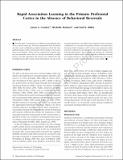Rapid Association Learning in the Primate Prefrontal Cortex in the Behavioral Reversals
Author(s)
Cromer, Jason; Machon, Michelle; Miller, Earl K.
DownloadCromer-2010-Rapid Association Le.pdf (188.3Kb)
PUBLISHER_POLICY
Publisher Policy
Article is made available in accordance with the publisher's policy and may be subject to US copyright law. Please refer to the publisher's site for terms of use.
Terms of use
Metadata
Show full item recordAbstract
The pFC plays a central role in our ability to learn arbitrary rules, such as “green means go.” Previous experiments from our laboratory have used conditional association learning to show that slow, gradual changes in pFC neural activity mirror monkeys' slow acquisition of associations. These previous experiments required monkeys to repeatedly reverse the cue–saccade associations, an ability known to be pFC dependent. We aimed to test whether the relationship between pFC neural activity and behavior was due to the reversal requirement, so monkeys were trained to learn several new conditional cue–saccade associations without reversing them. Learning-related changes in pFC activity now appeared earlier and more suddenly in correspondence with similar changes in behavioral improvement. This suggests that learning of conditional associations is linked to pFC activity regardless of whether reversals are required. However, when previous learning does not need to be suppressed, pFC acquires associations more rapidly.
Date issued
2010-07Department
Massachusetts Institute of Technology. Department of Brain and Cognitive Sciences; Picower Institute for Learning and MemoryJournal
Journal of Cognitive Neuroscience
Publisher
MIT Press
Citation
Cromer, Jason A, Michelle Machon, and Earl K Miller. “Rapid Association Learning in the Primate Prefrontal Cortex in the Absence of Behavioral Reversals.” Journal of Cognitive Neuroscience 0.0: 1-6. © 2010 The MIT Press
Version: Final published version
ISSN
0898-929X
1530-8898